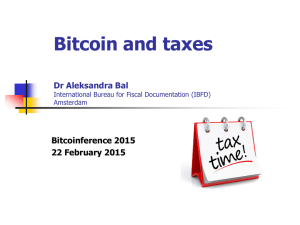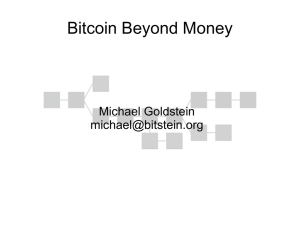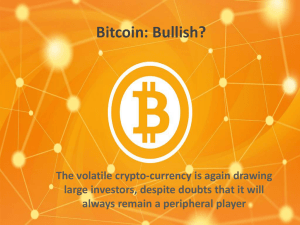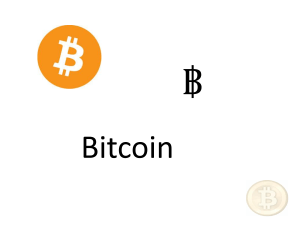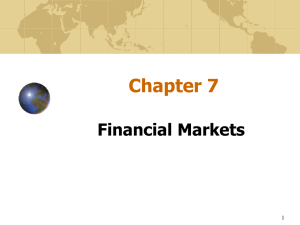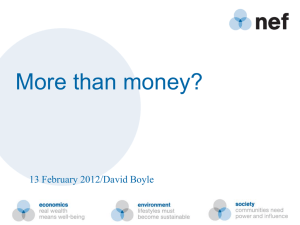Regulation and Compliance - Bitcoin Conference Thailand 2014
advertisement
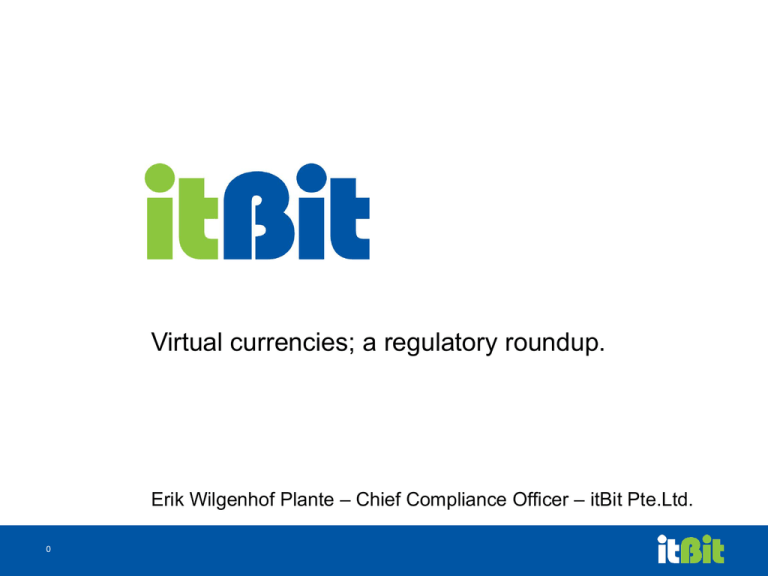
itBit Online Bitcoin Marketplace Presentation Virtual currencies; a regulatory roundup. Erik Wilgenhof Plante – Chief Compliance Officer – itBit Pte.Ltd. 0 0 A short history of virtual money In 1971 or 1972, Stanford students using Arpanet accounts at Stanford University's Artificial Intelligence Laboratory engaged in a commercial transaction with their counterparts at Massachusetts Institute of Technology. Before Amazon, before eBay, the first act of ecommerce was a drug deal. The students used the network to quietly arrange the sale of an undetermined amount of marijuana. 1 Virtual Financial Crime Drug lords and other bad guys found a new way to launder money: via online "virtual world" games that have thousands of players worldwide "Drug cartels are having great success laundering money and buying property in scores of different nations by using Internet games" 2 Virtual Financial Crime • In 2008 a money laundering operation (working with gold farmers and MMO account thieves) was busted while trying to move $38 million between Korea and China. • The money laundering ring reportedly sold game money illegally produced in China using cheap labor and virus programs. They are believed to have taken a commission of three to five percent of the money traded to purchase game money." • Games that attract Gold Farmers include World of Warcraft, League of Legends and Runescape. 3 Crime as a service • Liberty Reserve was a Costa Rica-based website that billed itself as the "oldest, safest and most popular payment processor ... serving millions all around a world". • In 2011, Liberty Reserve was linked to attempts to sell thousands of stolen Australian bank account numbers and British bank cards. In 2012, a group of hackers attempted to blackmail anti-virus software company Symantec into transferring $50,000 into a Liberty Reserve account. • The site had over one million users when it was shut down by the United States government. Prosecutors argued that due to lax security, alleged criminal activity largely went undetected, which ultimately led to them seizing the service in May 2013. • Liberty Reserve purposely used “willful blindness” by not requiring any form of identification at all. 4 Silk Road; the online market for criminals • Silk Road was an online trading place that let anonymous users trade drugs and illegal services using Bitcoin. • On October 2, 2013, Ross William Ulbricht, alleged by the FBI to be the owner of Silk Road and the person behind the pseudonym "Dread Pirate Roberts," was arrested in San Francisco. • The site was seized but alternate sites have already sprung up 5 Virtual Currencies Bitcoin vs. Altcoins Bitcoin is a distributed, peer-to-peer digital currency that functions without the intermediation of any central authority. The concept was introduced in a 2008 paper by a pseudonymous developer known as "Satoshi Nakamoto There are currently 127 different altcoins on the market. To name a few: • Litecoin • Namecoin • PP coin • Dogecoin All cryptocurrencies have one factor in common with fiat currencies: users need to trust the source Hundreds of real life legitimate vendors already accept Bitcoin. 6 Who is active in Bitcoin? • • • • • • • • • • • Techies Anarchists Libertarians Criminals Payment Startups Financial Service Companies Exchanges Hedge Funds Banks Regulators Investors Basically the same people that are “active” in “money”! 7 Is Bitcoin going bad? Regulatory Focus / Concerns • Bitcoin faces regulatory push in Senate Banking Committee Hearing • China’s PBOC bans financial companies from Bitcoin transactions • India and Thailand banning Bitcoin outright Hacking / Theft • Bitcoin payment processor BIPS was attacked, over $1million stolen • Hackers steal $1.2m of bitcoins from Inputs.io • Bitcoin exchange Mt Gox files for bankruptcy after losing 744,408 bitcoins in a theft which went undetected for years Bitcoin Bubble / Currency Failure • Greenspan says Bitcoin a ‘bubble’ without intrinsic currency value 8 Potential Risks of Virtual Currencies Fraud/Scam • $4.1m goes missing as Chinese bitcoin trading platform Global Bond Limited (GBL) vanishes • Alleged Bitcoin Ponzi scheme faces SEC suit Money Laundering • The ‘Silk Road’ is shut down, and the owner is in custody. Feds confiscated 144K bitcoins, worth $133m • Charlie Shrem, a Bitcoin executive arrested was for money laundering. The vice chairman of the Bitcoin Foundation and CEO of BitInstant was charged by U.S. prosecutors with conspiring to commit money laundering by helping to funnel cash to illicit online drugs bazaar Silk Road. 9 Legitimate Compliance Concerns Virtual currencies like Bitcoin have characteristics that are attractive for criminal users. • High level of anonymity • Portability • Easy transferable • Easy to conceal 10 Regulatory Roundup 11 Thailand Senior members of the Foreign Exchange Administration and Policy Department advised that “due to lack of existing applicable laws, capital controls and the fact that Bitcoin straddles multiple financial facets... Bitcoin activities are illegal in Thailand". However, since February 15, 2014, according to a letter from the Bank of Thailand, the current situation is that Bitcoin can be traded in Thailand so long as it’s only converted to/from Thai baht. So Bitcoin cannot be used as a way of converting foreign currencies in the nation. Bank of Thailand says it has no plans to expand the laws to regulate Bitcoin. 12 Thailand Jaturong Jantarangs, the Bank of Thailand's senior director of the payment systems policy department, said a company providing bitcoin exchange against the baht does not require approval or a licence from the central bank because bitcoin and other virtual currencies are not recognised as legal tender in Thailand. However, it has to comply with other related laws such as the Civil and Commercial Code, Consumer , and Anti-Money Laundering Regulations, he said. 13 Singapore • Singapore plans to regulate virtual-currency intermediaries including operators of Bitcoin exchanges and vending machines • They will start with Anti-Money Laundering and Terrorist Financing rules “Consumers and businesses should take note of the broader risks that dealing in virtual currencies entails and should exercise the necessary caution” MAS Deputy Managing Director Ong Chong Tee 14 Singapore The Managing Director of the Monetary Authority of Singapore (MAS), Ravi Menon, has commented on bitcoin and digital currencies in an interview, saying they “have a role to play” in the future. “It is hard to divine how technology and practices will evolve, 20 or 30 years from now. I would say virtual currencies have a role to play” 15 Indonesia Bank Indonesia takes a neutral stance after first issuing a statement that Bitcoin may break banking regulations “Noting the Law no. 7 of 2011 on Currency and the Law no. 23 of 1999 which was amended several times, most recently by Act no. 6 In 2009, Bank Indonesia states that the virtual currency bitcoin and others do not constitute currency or legal tender in Indonesia. People are encouraged to be careful of bitcoin and other virtual currencies. All risks related to ownership/use of bitcoin will be borne by the owner/user of the virtual currency bitcoin and others.” 16 Vietnam The State Bank of Vietnam released a warning statement on 28 February 2014 which states that the use of virtual currency Bitcoin and other similar means of payment is not legally recognized and protected, according to the current law on currency and banking in Vietnam, and that investment in such the currencies was potentially very risky. “Credit institutions are not allowed to use the virtual currency Bitcoin and other similar currencies as a means of payment or the provision of services to customers. Organizations and individuals should not invest, hold or perform transactions involving the virtual currency Bitcoin and other similar property as this is a potentially very risky and not protected by law defense" 17 Cambodia The Phnom Penh Post is reported that the Cambodian government, or at least the central bank there, will not recognize Bitcoin as a currency. “[The National Bank of Cambodia] will not recognize a currency that is not issued or backed by a government,” director-general Chea Serey said in a statement. “Bitcoin’s issuer is not a central bank of any jurisdiction.” 18 Philippines On 6 March 2014, BSP issued a statement on risks associated with Bitcoin trading and usage. Bitcoin exchanges are not regulated by BSP at the moment. BSP will be monitoring the possibility of Bitcoin usage in money laundering and other illegal purposes. “It has come to the attention of the Bangko Sentral ng Pilipinas (BSP) that virtual currencies like Bitcoin are now being exchanged in the Philippines. The public is hereby warned that such exchanges are not regulated by the BSP or by any regulatory authority in the country at this time. Thus, there are no existing regulations which would specifically protect consumers from financial losses if an organization that exchanges or holds virtual currencies fails or goes out of business. Moreover, there is no assurance that the value Bitcoin or any virtual currency would be stable. In fact, its value can be highly volatile. The BSP will be closely monitoring developments on these virtual currencies particularly on their possible use for money laundering and other illegal purposes, and will adopt appropriate measures as needed.” 19 Malaysia Bank Negara Malaysia (BNM) issued a statement in January 2014 that Bitcoin is not recognized as a legal tender in Malaysia. The central bank will not regulate Bitcoin operations at the moment and users should aware of the risks associated with Bitcoins usage. 20 India • In June 2013, the Reserve Bank of India (RBI) issued a notice acknowledging that virtual currencies posed legal, regulatory and operational challenges. In August 2013, a spokesperson wrote in an email that Bitcoin was under observation. • On 24 December 2013, the Reserve Bank of India issued an advisory to the Indian public not to indulge in buying or selling of virtual currencies, including Bitcoins.[28] Following the announcement Bitcoin operators in the country began suspending operations.[29] • The first raid in India was undertaken a couple of days later in Ahmedabad by the Enforcement Directorate (ED) on the office of the website, buysellbit.co.in, that provided a platform to trade in this virtual currency. The preliminary investigations found it to be in violation of the Foreign Exchange Management Act (FEMA). • On 28 December 2013, the Deputy Governor of the RBI, K. C. Chakrabarty, made a statement that RBI had no plans to regulate Bitcoins. 21 Immediate and long term concerns • Virtual currencies are in their infancy but maturing rapidly • To be accepted and operate in the main stream, virtual currencies need a solid compliance framework • The current lack of regulations and the different views of regulators is challenging and creates risk • Lack of regulation and sensational press has created a bad image of the virtual currency industry • Traditional financial institutions see virtual currencies as a fad or as a competitor • The compliance and AML community has a unique chance to shape the future by engaging regulators and traditional financial institutions. 22 Designing a Bitcoin proof Compliance Framework • Integration of risk and compliance systems • Automated and centralized onboarding • Focus on account behavior • Closed loop systems • Exchange of information • “Colored” coins But most of all: dialogue 23 24
